2024 ANNUAL REPORT
Casey Covington, PE, AICP Executive Director
Lynn Bell Graphics Specialist
Sydney Dozier Public Outreach Planner
Tammy Gillis Administrator
Leesa Freasier Grants Administrator

Casey Covington, PE, AICP Executive Director
Lynn Bell Graphics Specialist
Sydney Dozier Public Outreach Planner
Tammy Gillis Administrator
Leesa Freasier Grants Administrator
Hans Haustein GIS Analyst/Planner Performance Measure Coord.
Daniel Holland Transportation Planner/ Program Manager
Paritosh Jambhale Community Planner
Jonathan Lupton, AICP Senior Planner for Publications
Susan Markman, AICP, CGF Part-time Planning Consultant
Bernadette Rhodes Senior Regional Planner for Partnerships and Grants
Jeff Runder, AICP Senior Planner for Technical Analysis
Allen Skaggs Planning Technician
Iris Woods Receptionist
Prepared by: Lynn Bell, Casey Covington, Sydney Dozier, Hans Haustein, Daniel Holland, Jonathan Lupton, Bernadette Rhodes Graphics and layout: Lynn Bell
All photos are by Metroplan staff except where noted.
This report was funded in part through grants from the Federal Highway Administration and Federal Transit Administration, U.S. Department of Transportation. The views and opinions of the authors expressed herein do not necessarily state or reflect those of the U.S. Department of Transportation.
Metroplan complies with all civil rights provisions of federal statutes and related authorities that prohibit discrimination in programs and activities receiving federal financial assistance. Therefore, Metroplan does not discriminate on the basis of race, sex, color, age, national origin, religion or disability, in the admission, access to and treatment in Metroplan’s programs and activities, as well as Metroplan’s hiring or employment practices. Complaints of alleged discrimination and inquiries regarding nondiscrimination policies may be directed to Sydney Dozier, ADA/504/Title VI Coordinator, 501 West Markham Street, Suite B, Little Rock, AR 72201, (501) 372-3300, or the following e-mail address: sdozier@metroplan.org. (Hearing impaired may dial 711.)
This notice is available from the ADA/504/Title VI Coordinator in large print, audiotape or braille.
Dear Reader,
During 2024, I completed my last full year as President of Metroplan. It was a banner year marked by outstanding progress.
On July 22, 2024 Metroplan won an EPA grant for $99.99 million. This Climate Pollution Reduction Grant (CPRG) was a consortium involving the Northwest Arkansas and Fort Smith regions and half of the state’s population. Metroplan is the lead agency, gaining $49.9 million for clean energy, trail improvements, tree-planting, and energy efficiency projects across Central Arkansas. Metroplan has also been a leader in the state’s Energy and Environment Innovation (EEI) plan.
At the same time, Metroplan had a highly successful year in its familiar role in transportation planning, with twin goals of improving safety and reducing congestion. Working with the federal Safe Streets for All (SS4A) program, Metroplan launched the Central Arkansas Safety Action Plan, committing to reduce transportation fatalities 40 percent by the year 2040. In November of 2024, Metroplan also earned a $900 thousand federal grant for safety improvements and assisted the City of Little Rock with winning a $25 million safety grant.
2024 also marked the completion of Metroplan’s twelfth rail grade separation project, fulfilling a promise the Metroplan Board made in 1997 to upgrade road and rail safety across the region. Metroplan also worked with the Port of Little Rock in completing a study for the South Loop project.
Active transportation will have a major role in our future, and I am glad to report that the Regional Greenways Project, originally proposed five years ago, is seeing progress with plenty of trail construction underway.
In June of 2025, I handed over the Metroplan presidency to Judge Alan Dodson of Faulkner County. I wish him the best and, as a continuing member of the Metroplan Board, I will do all in my power to help him. It is a great job, and I am eager to witness even more innovations and accomplishments by this outstanding organization.
Judge Barry Hyde, Pulaski County Metroplan President

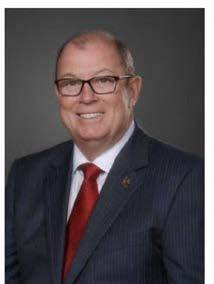
In January 2024, Metroplan adopted Central Arkansas Transforming Mobility, the region’s long range metropolitan transportation plan (MTP). The MTP guides transportation planning and investments over the next 5 years, as well as sets the vision for efforts through the year 2050.
The planning process developed 6 regional goals through public involvement and 9 core policies that drive Metroplan’s decisions toward our goals. The plan is built on a foundation of other Metroplan plans like the Multimodal Infrastructure Guidelines, the Unified Development Ordinance, and the Central Arkansas Regional Greenways Plan.
Core Policies
1.
2.
3.
4.
5.
Make equity and accessibility integral to all Metroplan’s planning efforts through consistent and systematic, fair, just, and impartial treatment of all individuals.
Design and implement multimodal corridors based on seven corridor types from the Multimodal Infrastructure Guidelines, for: Connectivity, Accessibility, Safety, Placemaking, and Active Transportation.
Maintain current roadway network and prioritize projects that optimize existing infrastructure before expanding capacity.
Develop the Regional Greenways to create a more complete transportation network.
Strengthen coordination between land development and the transportation network by encouraging mixed- use and flexibility in housing.
Support regionwide transit development that adapts to a dynamic transportation environment.
Embrace new technologies and best practices to optimize mobility and protect the environment.
8.
9.
Build upon state freight planning to identify critical local freight corridors and increase intermodal options.
Collaborate with local, regional, and state partners to advance Central Arkansas.
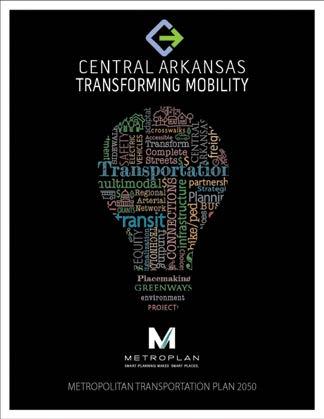
1: Active Neighborhoods and Placemaking
Transportation investments and land development practices should achieve active walkable and bikeable communities, transit readiness, and quality public places, while supporting economic vitality and livable communities.
2: Accessible Transportation
Transportation infrastructure should link the region’s jurisdictions, neighborhoods, and activity centers by defining a robust, seamlessly connected multi-modal system. All users should have access to affordable transportation options that link homes, employment and essential services.
3. Reliable, Resilient, and Safer Transportation and Environments
The transportation system should be designed and maintained to address infrastructure condition, congestion, safety, and environmental impacts. The transportation system should support the needs of a region with varying urban, suburban, and rural populations and landscapes.
4. Innovation in Transportation and Land Development
From policy to infrastructure construction and maintenance, innovative ideas and technologies should be deployed to benefit pedestrians, motorists, transit riders, cyclists, and telecommuters. Freight movements should be optimized using intermodal connectivity.
5. Regional Collaboration and Identity
Regional partnerships, policies, and programs should encourage local policy decisions and investments that foster a connected and equitable transportation system that elevates Central Arkansas nationally.
The Smooth Commute Campaign employed an online survey for the public to identify specific locations with congestion issues, and to determine potential causes. The online survey was advertised on Metroplan’s website, through social media, and at community events across the region. The online survey was designed to overlap the October 2024 time phase for the quantitative analysis of the National Performance Management Research Data Set (NPMRDS) traffic data.
Local citizens proposed solutions in congested areas, such as: signal timing, adding turn lanes and turn bays, longer merge lanes, roadway widening, building alternative routes, and adding roundabouts.

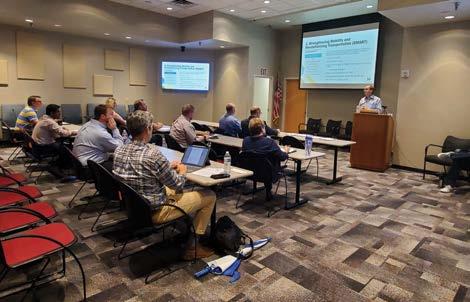
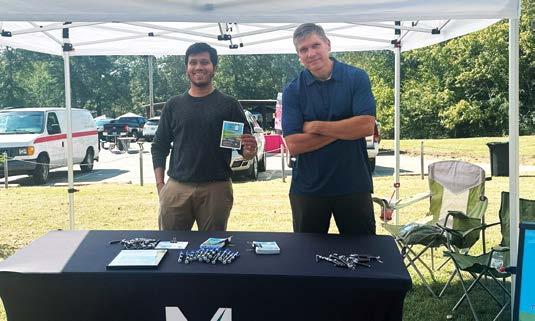

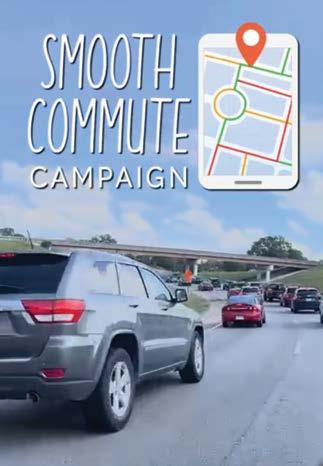
Metroplan is collaborating with state and regional agencies to develop the Arkansas Energy and Environment Innovation (EEI) plan, which will guide investments and incentives to keep the state’s air clean, protect its natural resources, and electrify economic development in Arkansas.
Funding for this plan is provided by a Climate Pollution Reduction Grant (CPRG) from the United States Environmental Protection Agency (EPA). The Central Arkansas EEI Planning Team focused its first few months of planning on conducting meaningful engagement with stakeholders and the public, with an emphasis on outreach to low income and rural communities. Activities included social media and press releases, surveys, workshops, presentations, and attendance at festivals around the region.
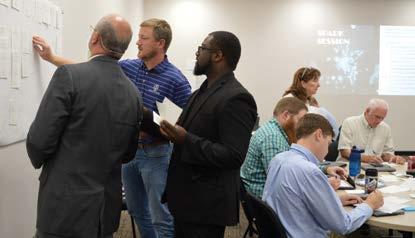

https://forms.microsoft.com/r/Bm2qe433bJ
Arkansas Community Survey 2024
your priorities for investments in efficiency and sustainability solutions in Central Arkansas by completing this short survey!

Metroplan launched a Central Arkansas EEI survey to gauge regional priorities and gather project ideas. The survey ran from July-December 2024 and collected 149 responses.
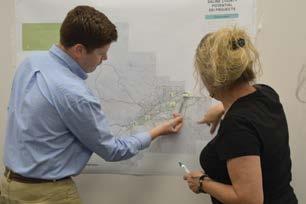
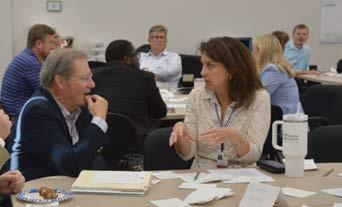
In August, Metroplan members and stakeholders gathered to identify EEI priorities and possible approaches for their communities.
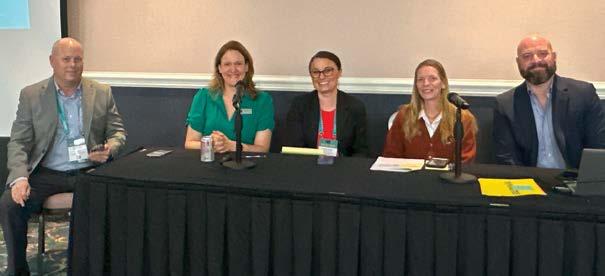
In October, the Arkansas Tri-Region Coalition presented at the American Planning Association’s Quad State Conference in Fayetteville, highlighting the proposal that was selected for a $100 million EPA CPRG award. From left: Tim Conklin (NWARPC), Bernadette Rhodes (Metroplan), Nicole Gibbs (NWARPC), Erika Droke (AR Dept. of E&E), and Joshua Robertson (City of Fort Smith). These partners were instrumental to the success of the grant proposal.
On July 22nd, 2024 the Environmental Protection Agency (EPA) announced that the Arkansas Tri-Region CPRG Coalition had been selected for a $99,999,999 Climate Pollution Reduction Grant (CPRG) award for its “Energy and Environment Innovation for the Natural State” proposal. This transformative grant will fund projects throughout Central Arkansas, Northwest Arkansas, and the Arkansas River Valley, representing half the Natural State’s population. Metroplan served as the lead agency on the grant submittal, one of only 25 funded nationally.
"It was truly a team approach. It’s a testament to partnerships,
thinking big, working together to make this happen."
Tim Conklin, Northwest Arkansas Regional Planning Commission Executive Director
Central Arkansas’ $49.25 million allocation will fund projects to sequester and reduce emissions by protecting and restoring natural areas, increasing efficiency, and improving access to active transportation and transit. Projects such as LED streetlights and EV charging will reduce emissions from the transportation sector, and building efficiency funding will support net-zero technologies for public and commercial buildings. Projects will be designed to ensure broad access to the environmental benefits funded by the grant.
By joining this coalition, we were excited about the projects that will be funded and that will improve our infrastructure and enhance the well-being and quality of life in our city and in our region.
Pulaski County Judge Barry Hyde
EPA Climate Pollution Reduction Grant
million
• Cleaner air and water
• Biodiverse habitat and wildlife corridors
• Forest and stream sestoration
• Reduction of urban heat islands
• Multimodal connections
• Transportation and building efficiency
Preserving the Natural State A Natural State for All Putting the Natural State to Work
• Hands-on training workshops
• Pre-apprentice and apprentice programs
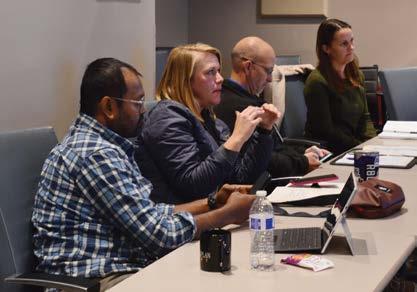
Upon launch of the CPRG grant, Metroplan’s Grant Administrator Leesa Freasier (right) and Deputy Director Bernadette Rhodes (far right) held a series of workshops to connect with partners and explain funding opportunities.
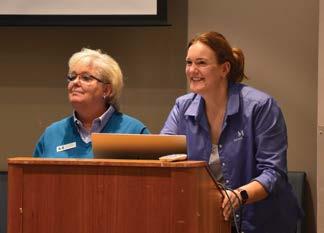

On July 20, Pulaski
$
• Technician and manager certification program
"It was very historic for all three of our regions to come together on this type of grant. There’s not been a grant that’s been released, of this nature and of this size."
—Joshua Robertson, Director of Sustainability
and Citizen Services for the City of Fort Smith
hosted a press
"Our citizens will benefit for decades to come. Today’s grant is possible because of the support of the Metroplan Board of Directors, the state of Arkansas and the federal delegation. Thank you for your support."
Casey Covington, Metroplan Executive Director
Safety must always come first, and therefore must be a critical component of any transportation system. In April of 2024, with the help of funding from the U.S. Department of Transportation (USDOT), Metroplan launched the Central Arkansas Safety Action Plan. It is also known as SS4A—“Safe Streets for All”— and aims toward a goal of zero fatalities. On the way to this goal, the Metroplan Board committed to a 40 percent reduction in transportation-related fatal and serious injuries by the year 2040.
During 2024, as part of its SS4A program, Metroplan developed separate safety plans for each of the four counties in its planning area. In October of 2024, these county plans were added as an amendment to the original Central Arkansas Safety Action


The Regional High Injury Network contains about 55 percent of all reported fatal and serious injury crashes involving pedestrians that occurred within the Central Arkansas Region from 2018 through 2022.
Plan. In addition, USDOT awarded Metroplan a $900,000 SS4A Planning and Demonstration Grant in November of 2024. This grant will provide enhancements to high-speed signalized intersections, EMS vehicle safety alert technology, and will pilot high visibility crossings for the regional trail system.
"The
System Approach."




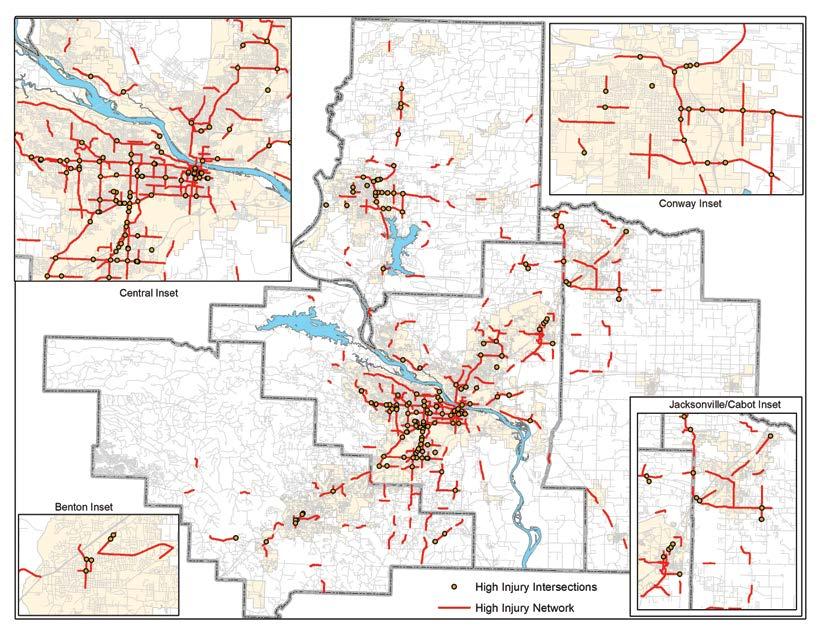
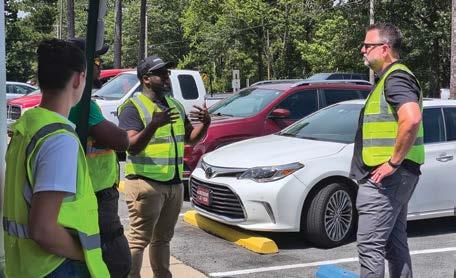
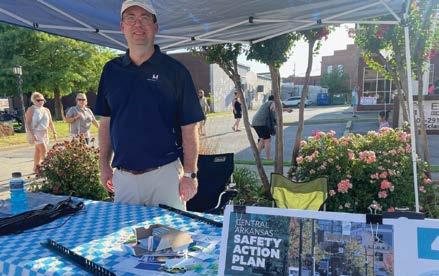
During 2023, Metroplan earned a $700,000 grant as part of the federal SS4A program. In 2024, Metroplan staff used this grant to identify the most important regional safety needs. Metroplan worked with the City of Little Rock to earn a $25 million grant to implement safety improvements at critical intersections and other points on the following routes:
• Geyer Springs Road
• University Avenue
• John Barrow Road
• Chicot Road
• Intersection of South Woodrow and West 12th Street
Metroplan also worked with Metropolitan Emergency Medical Services (MEMS), Pulaski County, Faulkner County, and A RDOT. In November 2024, this effort secured a $913,690 SS4A grant for:
• High-speed intersection enhancements, including warning systems to reduce collisions on high-speed roads.
• EMS vehicle safety alerts: Technology to help warn drivers of approaching emergency vehicles.
• High-visibility pedestrian crossings on the Southwest Trail to ensure safety for runners, walkers and bikers.
"With its policies and plan support, Little Rock has shown a commitment to implementing safe streets for everyone regardless of age, ability, income, or how they choose to travel.”
City of Little Rock , SS4A Grant Application FY 2024, p. 1
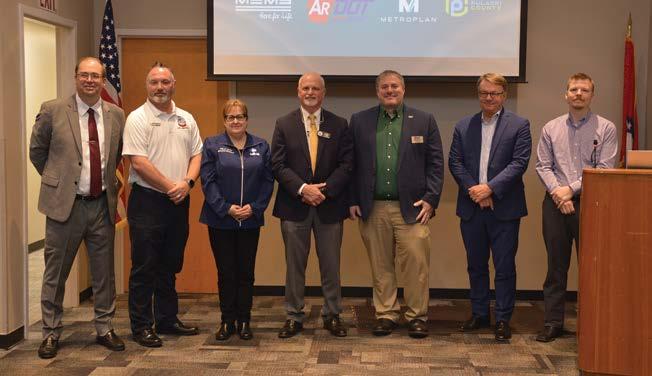
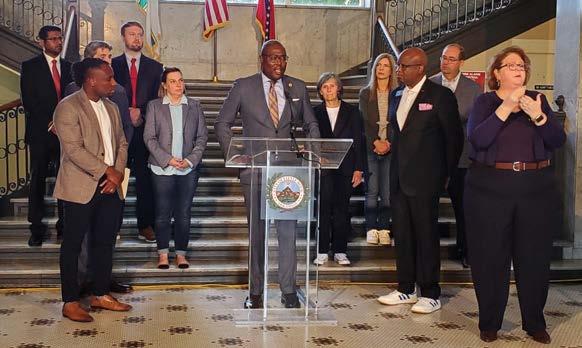
of
September 9 the
of
In 1997, the Metroplan Board approved a program called the CARTS Rail grade Separation Phasing Priorities. This rail grade study called for twelve rail grade separations (overpasses) across the region. Over the years, shifting transportation needs have caused a few projects to drop off the original list, while others have been added.

During 2024, Metroplan passed a milestone: the Crooked Creek Bridge on the Bryant Parkway became the twelfth rail grade separation completed since the original plan, attaining the goal set twenty-seven years earlier. The map below lists the completed rail grade separation projects.
The original 1997 rail grade study was part of the METRO 2020 Plan, in which Metroplan consulted with citizens in all parts of the region. One of the main concerns they raised was at-grade railroad crossings. According to the 1997 Metroplan Annual Report, such

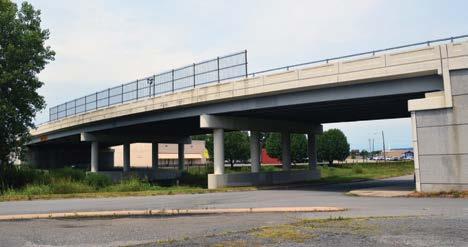
concerns included safety, vehicular delay, noise, and division of communities caused by numerous trains passing through: “As a result, METRO 2020 set aside $26 million (in 1997 dollars) in anticipated federal funds to construct highway/railway grade separations. Metroplan staff conducted a comprehensive analysis to prioritize rail grade separation needs throughout the region, identifying 12 locations.”
Sometimes the highest achievement of hard work is to make things seem so easy —like crossing a bridge over the tracks—that they are taken for granted. It has taken time, but long-range planning has delivered on its promise.
The Main Street railroad overpass was a long-term, multimillion dollar project. The Metroplan Board set aside funds for rail grade separations not only in Jacksonville, but in other communities. We were the first community to build a rail grade separation and we’re very pleased.
Tommy Swaim, Jacksonville Mayor, 1987–2009
Central Arkansas Rail Grade Crossings 2003–2024
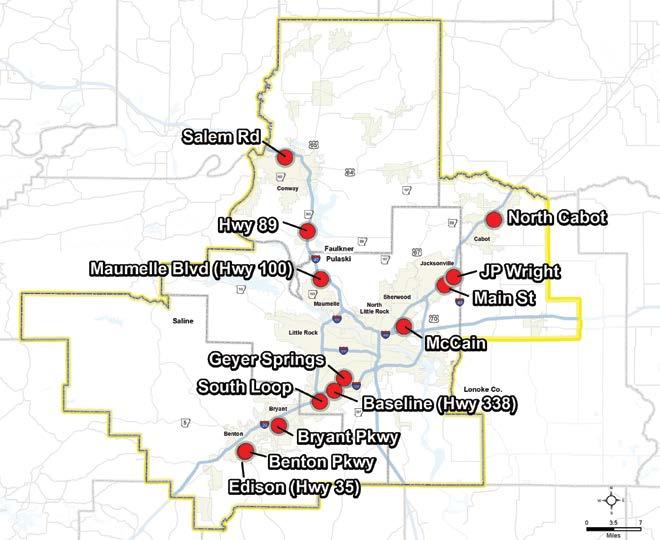
In July 2024, the J.P. Wright Loop Road railroad overpass in Jacksonville opened to traffic. The project allows traffic in northeastern Jacksonville to pass easily over Union Pacific tracks, improving safety as well as preventing train-delay traffic bottlenecks. This project marks the next-to-last rail grade separation completed by Metroplan, a project launched by the Metroplan Board in 1997.
On September 6, 2024, a ribbon was cut for a new rail grade overpass on the Bryant Parkway in Saline County. This marked the twelfth Metroplan-funded rail overpass since 1977, when the Metroplan Board approved a long-term project to replace
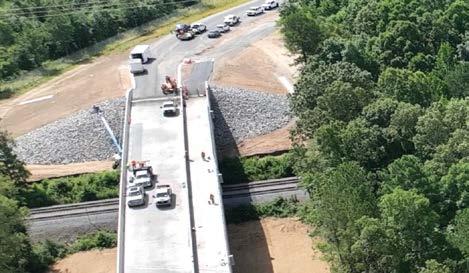
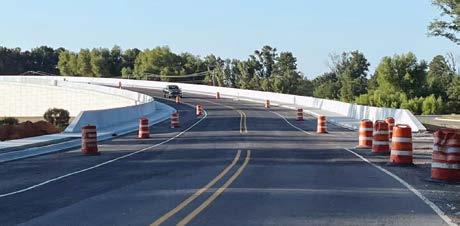
at-grade crossings across the region with bridges. Not only do crossings like this reduce congestion and make driving easier and safer, they also improve operations for the railroads.
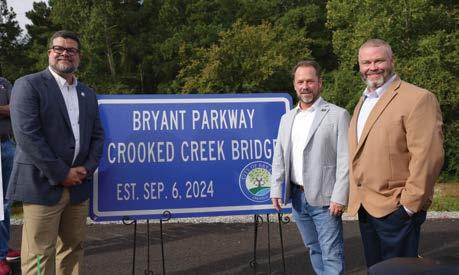
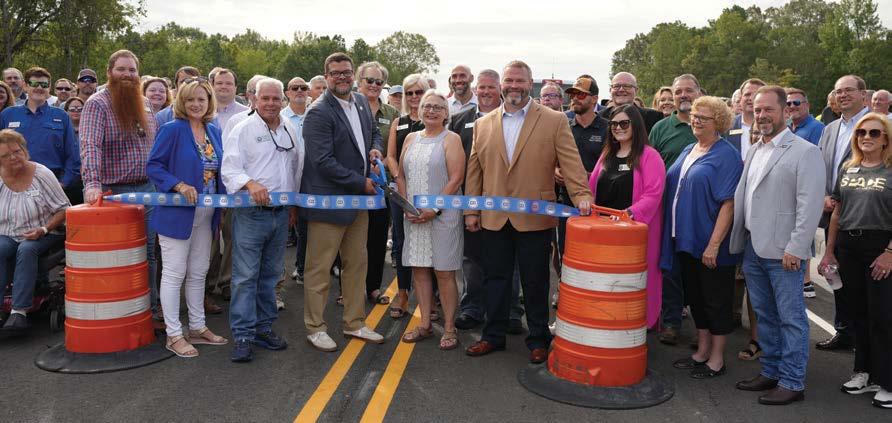
Staff and community partners kicked-off the 2024 Ozone Action Days (OAD) season with Bike-To-Work Day on May 17. OAD is a public awareness program designed to keep the public informed about potentially harmful ground-level ozone.
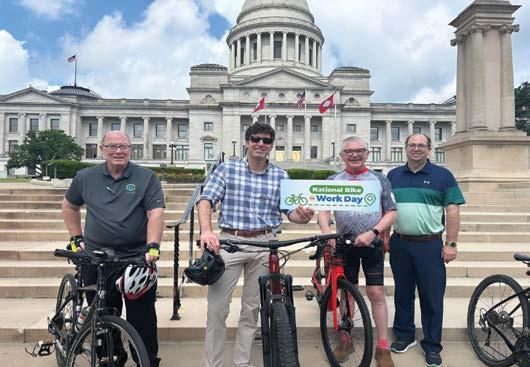

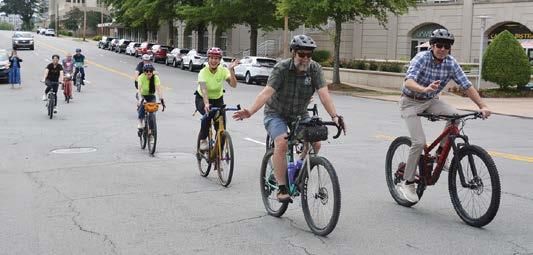
On December 3, 2024 local officials and representatives from the Arkansas Department of Transportation (ARDOT) cut the ribbon on “30 Crossing,” a project approved by the Metroplan Board during 2017. The project was controversial, but ARDOT responded to public input. By reconfiguring several intersections and providing extra lanes through two downtowns and across the Arkansas River, the 30 Crossing project has reduced congestion in Central Arkansas.
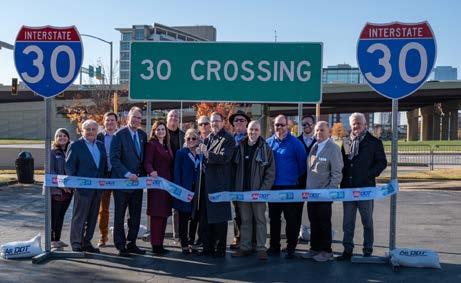
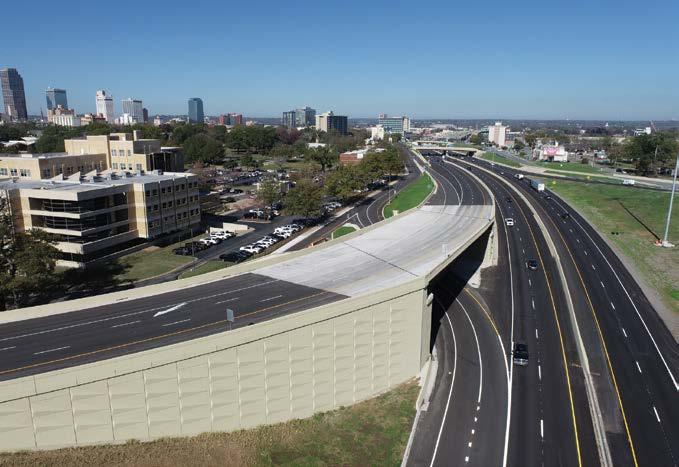
In the fall of 2024 Metroplan completed a study of the proposed “South Loop,” a potential route connecting between I-530 and I-440 southeast of Little Rock. The study was initially requested by the Port of Little Rock, a Metroplan member, to investigate potential transportation solutions in its vicinity. The Port hosted about 9,800 jobs in 2022, up from 4,200 as recently as 2017.
The Port is a major job center, with primarily manufacturing and warehousing facilities. Transportation has always been one of the Port’s key strengths, with good rail and barge connections, central location within regional and state freeway networks, and easy proximity to Clinton National Airport.
ALTERNATIVE #3
The study was done by Crafton Tull Associates, in collaboration with Michael Baker International. As with all Metroplan projects,
there was a substantial public engagement process, which included citizen participation from communities like Wrightsville and College Station. The study reviewed traffic problems in and near the Port of Little Rock, including traffic congestion on I-440 that often results when trains cause temporary blockage of the railroad crossing at Fourche Dam Pike.
The study identified a “preferred route,” along with several possible alternatives, with a potential project cost of at least $50 million. If the project proceeds, it will likely be done through a combination of federal, state and local contributions. At present no funds are allocated for this purpose. You can locate the study on Metroplan’s website at http://www.metroplan.org, which includes a link for “frequently asked questions.”
Alternative 3 includes two connections from I-440 at Fourche Dam Pike, which
Alternative 3 includes two connections from I-440 at Fourche Dam Pike, which will be linked to I-530 at Dixon
study, a new rail-grade separation is anticipated at near Highway 365.
most direct route to potential eastern super site development adjacent to Mills Middle School/High School along Road.
$55,396,250 >>> Additional miles from I-30 to Port: 4.9
The proposal for Alternative 3 includes two connections from I-440 at Lindsey Road and Fourche Dam Pike, which will be linked to I-530 at Dixon Road. As a part of this study, a new rail grade separation is anticipated at Lindsey Road and near Highway 365.
impacts to developed structures
Structures Less anticipated impacts to developed structures and existing communities.
• Shortest and most direct route
Fourche Improvement at Lindsey Road with grade separation forecasts traffic relief on Fourche Dam Pike from F to C in 2050
Industrial Land High potential to open additional industrial land for development
Improvement at Lindsey Road with grade F to open development
• Opens access to potential eastern super site development
Greatest potential Impacts on Environmental Areas
Shortest route from Lindsey Road; higher traffic volume expected
• Alignment runs adjacent to Mills Middle School/High School along Highway 338/Dixon Road.
Lowest construction cost
• Estimated cost: $55,396,250
connections
Emergency Provides connections at both Lindsey and Fourche Dam Pike with extension of new east/west road
Route
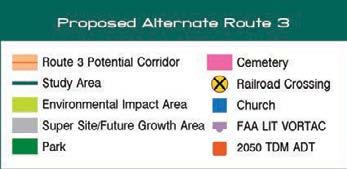

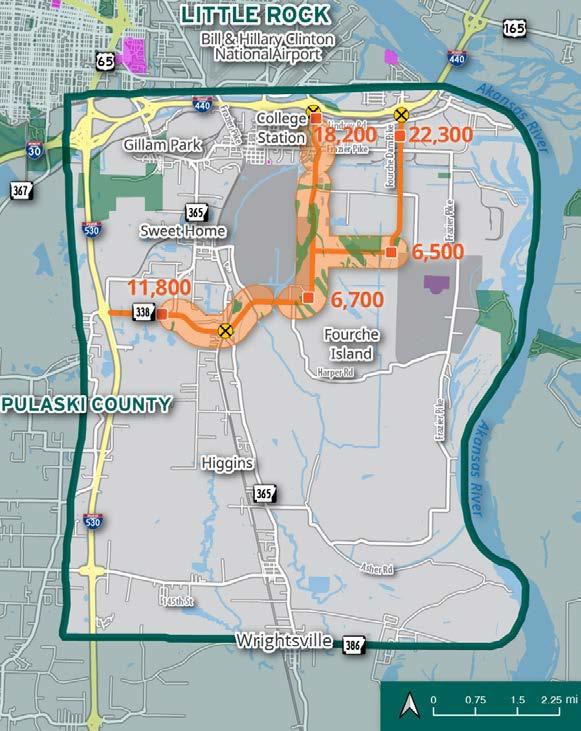

Since adoption of the Central Arkansas Regional Greenways Plan in 2023, several projects have been awarded funding for both design and construction, moving our trail network closer to reality. As of December 2024, Metroplan had awarded $25,100,000 of STBG and TAP* funds towards the network’s completion.
With its head start, the Southwest Trail accounts for the lion’s share of the awards, but the Northeast Corridor has found a champion in the cities of Austin and Cabot. Both cities have been awarded construction funding and are quickly moving to bid. Another Northeast Corridor project, Powerline Trail in Sherwood, has also
moved closer to construction with design substantially complete. North Little Rock’s long gestating Pike Avenue Trail phase 2, part of the Northwest Corridor, moved substantially through design and is on track to move to construction in late 2025.
As an added bonus, the greenways have inspired $7,825,000 in awards to major connecting trails. Benton, Bryant, Conway, Little Rock, Maumelle, North Little Rock, and Shannon Hills have developed trails that are intended to connect their cities to the planned regional corridors. As our greenways develop, Metroplan will continue to assess major connecting trails that can connect our citizens to the rest of the region.
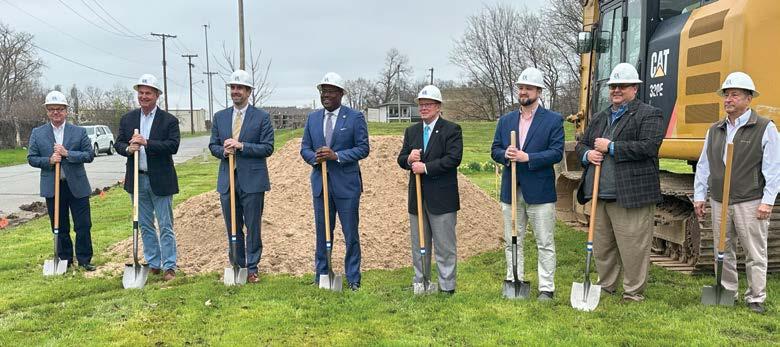
2024.
"We are really excited about this project, it’s been a long time coming. We’ve been working on it for close to 4 years now, so this first phase getting started is a big milestone for us.
Jon Honeywell, Little Rock Public Works Director
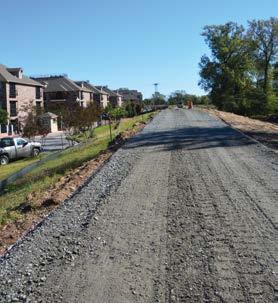
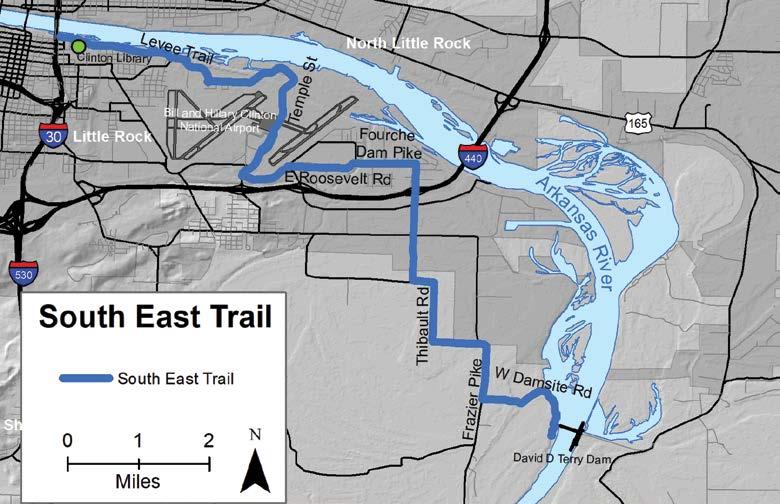
*Surface Transportation Block Grant Program (STBG) and Transporation Alternatives Program (TAP)
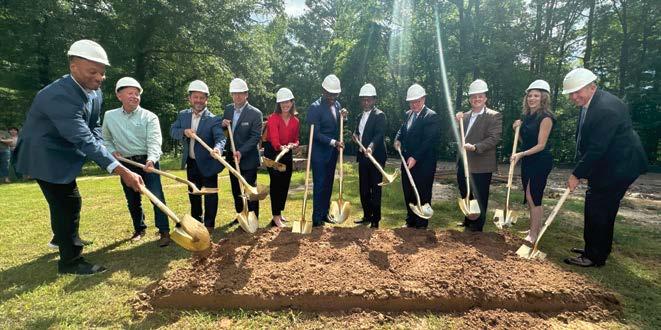
On May 14 Pulaski County and partners held a groundbreaking for the first phase of the Southwest Trail from Chicot Road to the Pulaski Counthy line. The event also marked the beginning of construction on Providence Park, a 50-acre master planned community that will provide affordable housing in a community setting.
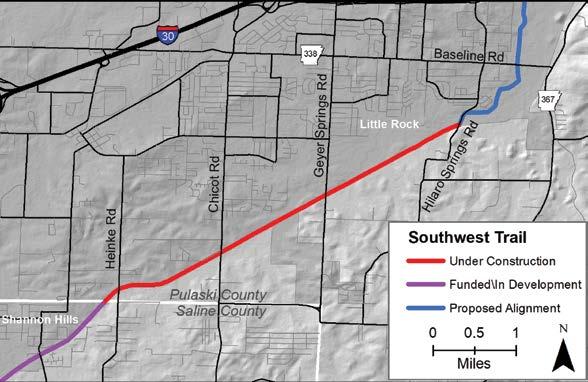
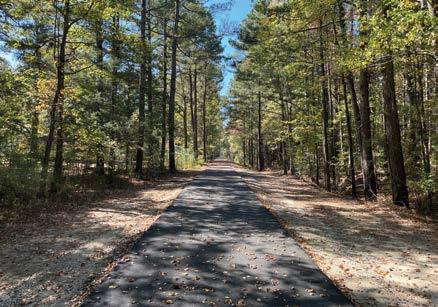

Existing Regional Greenway
Proposed Regional Greenway
Regional Greenway Under Construction
Regional Greenway Funded
"The Southwest Trail is all about connection— getting our communities connected and connecting the cities and our partners Pulaski and Garland Counties. This 60-mile trail is going to be fantastic."
Saline County Judge Matt Brumley
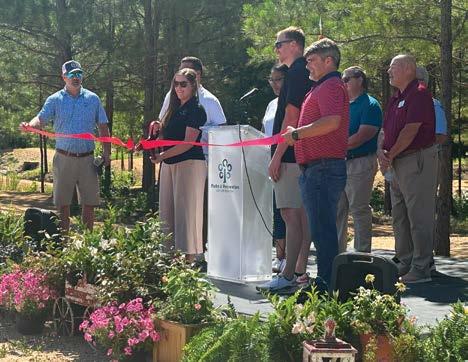
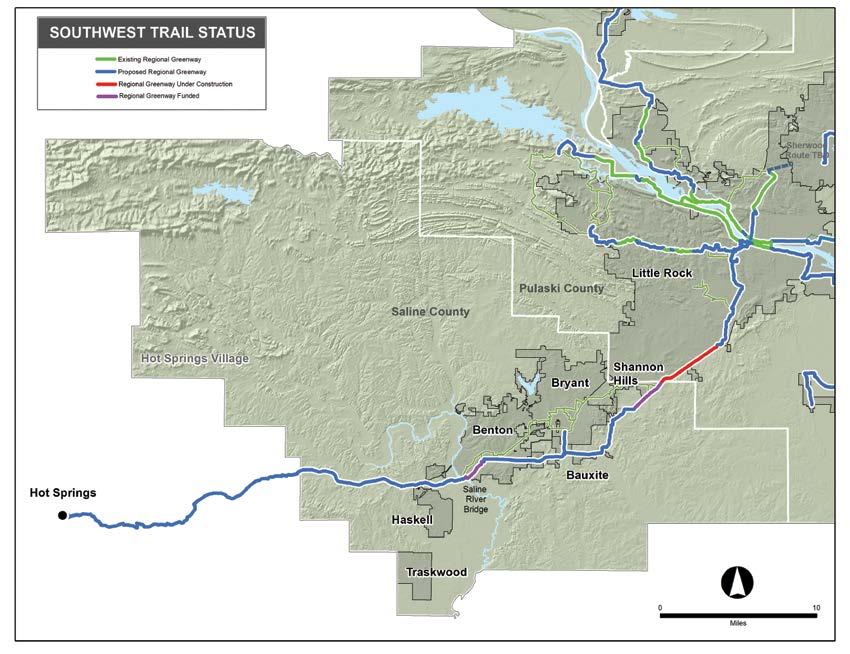
Metroplan staff stayed busy in 2024, helping member cities with comprehensive plans, zoning changes, and funding opportunities. Staff conducted extensive public outreach through social media, television interviews, and in-person events.
Staff also attended a one-day workshop focusing on teamwork and visioning the future of the organization. The workshop created an opportunity to identify Metroplan’s strengths and discuss areas of growth.
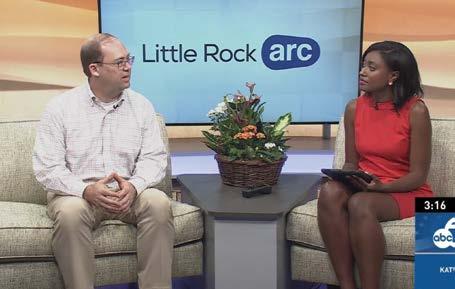

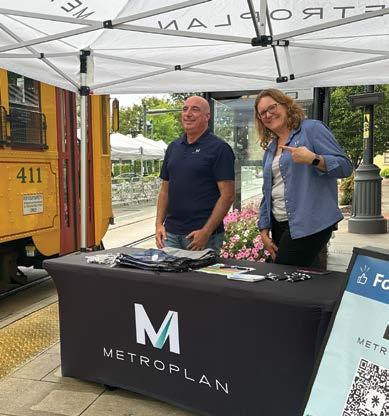
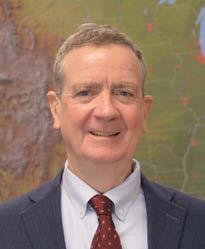
During 2024, Metroplan staffer Jonathan Lupton participated in the board of directors for AASHTO Census Transportation Solutions (ACTS). Serving a four-year term, Lupton helps guide research, development and public outreach for the Census Transportation Planning Program (CTPP), a joint effort between the U.S. Census Bureau and state and local governments. The CTPP provides data on local commuting flow demographics and is available free at: https://transportation.org/ ctpp/datasets/


Daniel Holland Earns AICP
Daniel Holland presented on complete streets at the Women in Transportation Arkansas Chapter’s September luncheon. In October, he shared Metroplan’s Regional Greenways planning process at the Quad State planning conference. He capped the year off by earning his American
Institute of Certified Planners (AICP) designation in December.
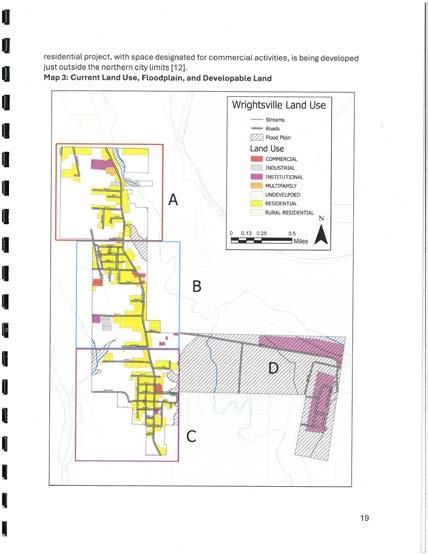
Metroplan staff worked with the City of Wrightsville to produce the Wrightsville Planning Studies Report to inform their upcoming Comprehensive Plan update.
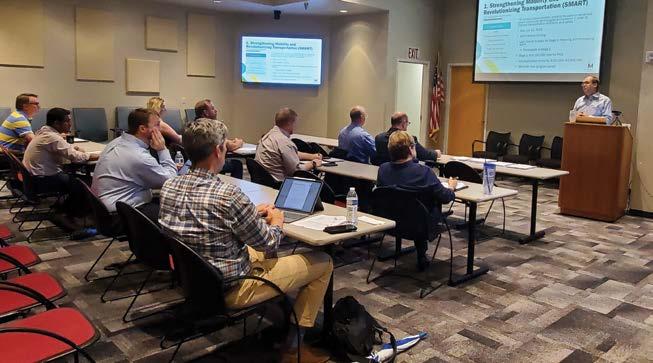
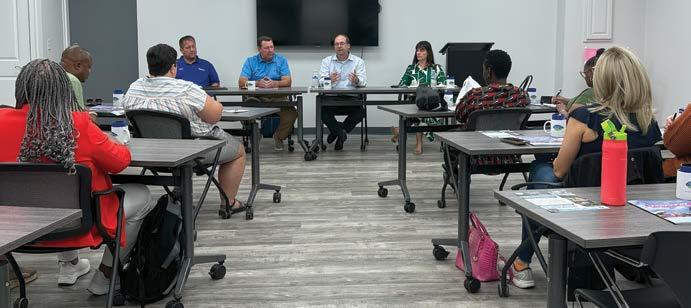
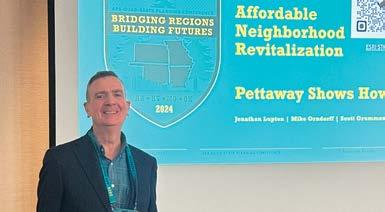
In October Jonathan Lupton participated in a presentation and panel discussion at the American Planning Association (Arkansas APA) conference. Jonathan also appeared on KATV's Little Rock Arc to discuss the Metrotrends Demographic Review and Outlook, which focused on infill development and how it relates to population and housing growth in Central Arkansas.

Leesa Freasier joined the Metroplan team in September 2024 as a Grant Administrator. She has over 18 years of grant administration experience, managing approximately $125 million in federal and state funds. She earned her Bachelor’s degree at Louisiana Tech University in Ruston, Louisiana and her Master’s at the University of Arkansas. She lives in Little Rock and is the proud mother of her daughter Katlee.

Paritosh Jambhale joined Metroplan in July 2024 as a Community Planner. He holds a Bachelor's degree in Architecture from Savitribai Phule Pune University, India, and a Master's degree in City and Regional Planning from Ohio State University, Columbus, Ohio. His wide range of skills spans from site-specific designs to regionwide transportation plans. His master’s thesis explored the influence of Bus Rapid Transit (BRT) on commercial and residential land use. Paritosh lives in Little Rock and takes the bus to commute to the office every day.
$22,500 $157,941
$1,447,413
$1,073,485
PRESIDENT
Judge Barry Hyde Pulaski County
VICE PRESIDENT
Judge Allen Dodson Faulkner County
Mayor Crystal Herrmann
City of Alexander
Mayor Bernadette Chamberlain City of Austin
Mayor Eddie Jones City of Bauxite
Mayor Tom Farmer
City of Benton
Mayor Chris Treat City of Bryant
Mayor Cody Kees City of Cammack Village
Mayor Bart Castleberry City of Conway
Mayor David “Butch” House City of England
Mayor Sammy Hartwick City of Greenbrier
Mayor Terry Williams City of Guy
Mayor Clyde Crookham
City of Haskell
Mr. Keith Keck
Hot Springs Village
SECRETARY/TREASURER
Mayor Ken Kincade City of Cabot
Mayor Jeff Elmore City of Jacksonville
Mayor Stephanie White City of Keo
Mayor Frank Scott, Jr.
City of Little Rock
Mayor Wayne McGee City of Lonoke
Mayor Caleb Norris City of Maumelle
Mayor Danny Hester City of Mayflower
Mayor Jonathon Hawkins City of Mount Vernon
Mayor Terry Hartwick City of North Little Rock
Mayor Mike Kemp City of Shannon Hills
Mayor Cain Nattin City of Sheridan
Mayor Mary Jo Heye-Townsell City of Sherwood
Mayor Kimberly Schane City of Traskwood
Mayor Preston Scroggin City of Vilonia
Mayor Charles Gastineau City of Ward
Mayor Terry Don Robinson City of Wooster
Mayor Derrick Rainey City of Wrightsville
Judge Randy Pruitt Grant County
Judge Doug Erwin Lonoke County
Judge Matt Brumley Saline County
Mr. David Siskowski Arkansas Department of Transportation
Mr. Justin Avery Rock Region METRO
Mr. Bryan Day Little Rock Port Authority
Mr. Steven Baker Clinton National Airport